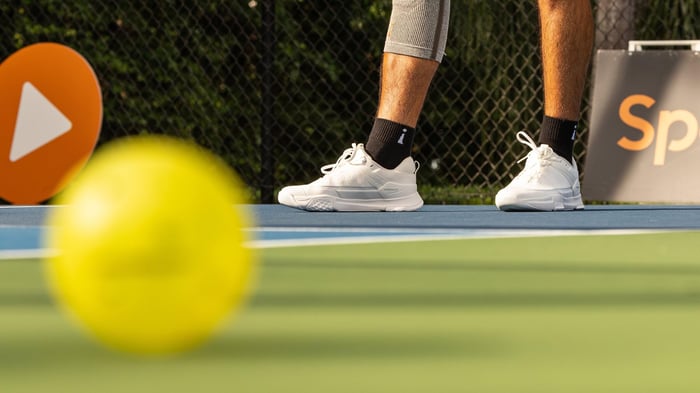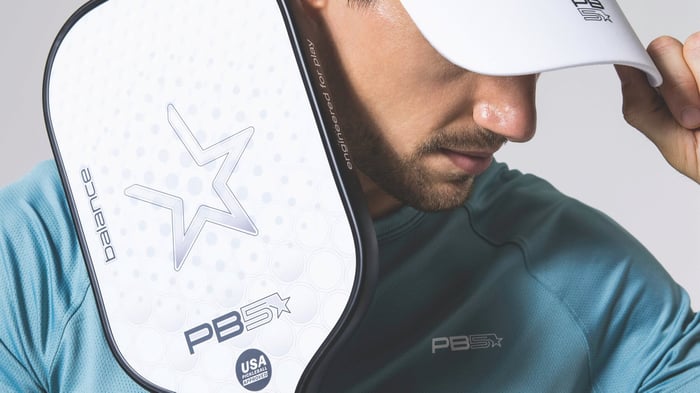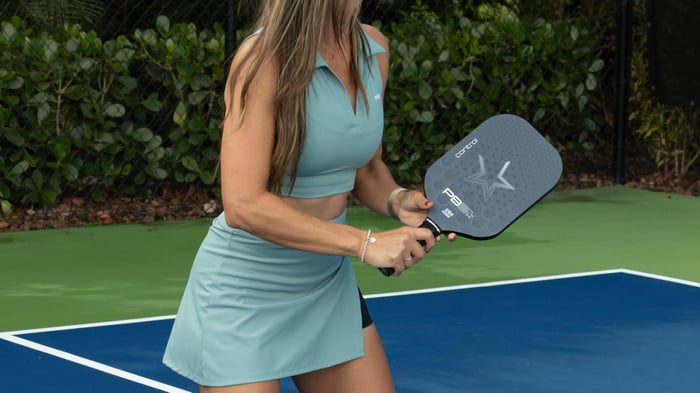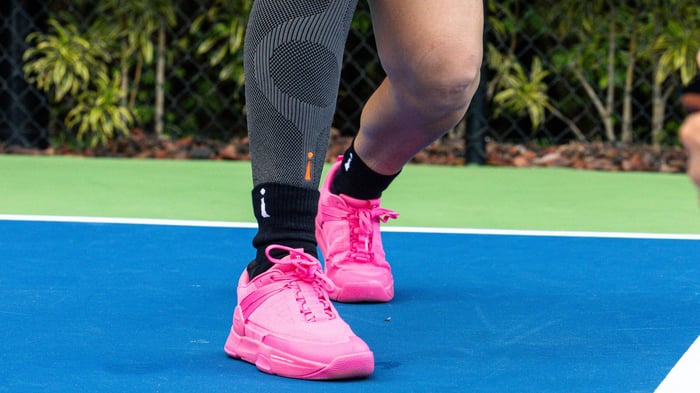Key takeaways:
Pickleball’s name comes from “pickle boat” in rowing, not a dog named Pickles.
“Pickle” in pickleball can mean a fast-paced rally or being caught in a tricky spot.
Knowing pickleball’s unique terms and sayings helps you connect and communicate with the community.
Have you ever felt like pickleball players are speaking their own secret language? Terms like "dinks," "kitchen," and "pickle" get tossed around on the court. If you’re wondering, “What is a pickle in pickleball?” you’re not alone. The sport’s vocabulary can be puzzling for newcomers, but learning these unique expressions is key to understanding the game and feeling like part of the vibrant pickleball community.
Understanding these terms isn't just about improving your game. It's about connecting with the amazing pickleball community. Born in 1965 on Bainbridge Island, Washington, pickleball has grown into a global phenomenon with 4.8 million players worldwide. As the sport evolves, so does its lingo, creating a rich tapestry of terms that reflect its core values of camaraderie and inclusion.
At PB5star, we're passionate about helping you experience the unique spirit of pickleball, from mastering the lingo to sporting gear that gives you confidence on the court. Let’s dive into the origins and some of the most colorful terms in the sport together.
The origin of the name
Have you ever found yourself in the heat of a match and hearing "pickle" shouted across the court? If you've ever wondered, "What does pickle mean in pickleball?" then keep reading, as the story behind this distinctive term is deeply woven into the fabric of pickleball's history.
Pickleball emerged in 1965 on Bainbridge Island, Washington, when Joel Pritchard, Bill Bell, and Barney McCallum created the game to entertain their families. But the term 'pickle' has roots that stretch beyond the court. So, why is it called pickleball?
The most credible theory links the name to competitive rowing. "Pickle boat" referred to crews composed of leftover rowers with varied specialties. Joan Pritchard, Joel's wife, drew a parallel between these diverse crews and the improvised nature of the new game, coining the term 'pickleball'.
You might have heard about Pickles, the Pritchard family dog, supposedly inspiring the name. While it's a charming tale, it's actually a myth. Pickles joined the family years after the game's invention, debunking this popular misconception.
If you’ve ever typed "how did pickleball get its name?" into a search bar, you're tapping into one of the sport’s most debated topics. As pickleball grew from a backyard pastime to a sport enjoyed by millions annually, the term 'pickle' became ingrained in its culture. The first official tournament in 1976 at the South Center Athletic Club in Tukwila, Washington, likely played a crucial role in cementing 'pickle' in the sport's lexicon. This also helped spread early pickle terms among players and fans alike.
This knowledge can even give you an edge on the court. When you hear 'pickle' during a fast-paced rally, you're not just participating in the game – you're part of a tradition that spans decades.
Common terms and their meanings
When you hear 'pickle' on the court, it often means more than just a tangy condiment. In pickleball, this versatile term packs a punch. Most commonly, a 'pickle' refers to a lightning-fast rally near the kitchen line, where players trade shots quicker than you can say "dink." It's that heart-racing moment when the ball zips back and forth, keeping everyone on their toes. But that's not all – 'pickle' can also describe a player caught in a tight spot, struggling to return a tricky shot.
During a match, you might catch players or spectators shouting, "They're in a pickle!" when a team is backed into a corner. Or after a particularly intense rally, someone might exclaim, "What a pickle!" These expressions showcase how deeply ingrained the term is in pickleball culture. Curious about the term “pickled in pickleball”? In some circles, it humorously refers to losing a game 11–0, an experience many players try to avoid!
Understanding and using these terms not only sharpens your mental game but also helps you connect with the vibrant pickleball community. It's all part of the sport's charm, fostering connections on and off the court.
How to use the pickle strategy in pickleball
Wondering how to use the pickle strategy in pickleball to up your game? These actionable tips will help you master those intense, rapid-fire exchanges and give you an edge on the court.
Perfect your quick reflexes with a partner drill. Stand at the kitchen line and practice rapid-fire volleys, gradually increasing speed. This sharpens your reaction time for those pickle moments. Pro tip: PB5star's moisture-wicking apparel keeps you cool and focused during high-intensity drills.
Master strategic court positioning. In doubles, communicate with your partner to cover the middle effectively. When a pickle situation arises, one player should take the forehand side while the other covers the backhand, maximizing court coverage.
Exploit your opponent's weaknesses. During fast exchanges, aim for your opponent's backhand or their less dominant side. This puts pressure on their weaker shots and can lead to errors.
Develop a deep, targeted serve. Practice serving deep to your opponent's backhand corner. This makes it challenging for them to mount a strong offensive return and can set you up for pickle opportunities.
Enhance your footwork agility. Incorporate ladder drills and quick side-to-side movements into your training routine. Improved footwork keeps you balanced and ready to react during intense pickle exchanges.
Embrace the pickle mindset. Stay calm under pressure and view pickle situations as opportunities to showcase your skills. Remember, pickleball is about community and fun – share your pickle strategies with fellow players at your local courts to foster a spirit of friendly competition.
By incorporating these strategies into your game, you'll be well-equipped to handle any pickle situation that comes your way. With PB5star's performance gear supporting your every move, you'll look and feel confident while doing it.
Frequently asked questions about pickleball’s name
Why is pickleball called pickleball?
Pickleball is called pickleball because its inventors borrowed the term from “pickle boat” in rowing, which referred to a mix of leftover rowers. This mirrors the game’s blend of rules and equipment. The quirky name has become an essential part of the sport’s identity.
What does pickle mean in pickleball?
In pickleball, "pickle" can refer to a fast-paced rally or a player caught in a tricky spot during play. It’s a term that highlights some of the sport’s most exciting and challenging moments.
What are some popular pickleball sayings?
Popular pickleball sayings include “Stay out of the kitchen,” “Dink responsibly,” and “They’re in a pickle!” These phrases capture the fun and friendly spirit of the game.
Why understanding pickleball terms improves your game
Mastering pickleball terminology isn’t just about expanding your vocabulary—it’s about gaining a strategic edge. Whether you’re wondering “Why is pickleball called pickleball?” or trying to understand common sayings, knowing terms like "pickle," "kitchen," and "dink" helps you communicate better with your partner, anticipate plays, and make quick decisions that can change the outcome of a match. As pickleball grows in popularity, understanding the lingo is key to connecting with the community and enhancing your performance. And if you've ever googled "pickle meaning" in a moment of confusion, you're not alone; every player starts somewhere!
At PB5star, we believe that knowledge and the right gear go hand in hand. Our performance apparel is designed to support your game, so you can focus on mastering the sport. Ready to take your skills to the next level? Check out our signature line and step onto the court with confidence.







